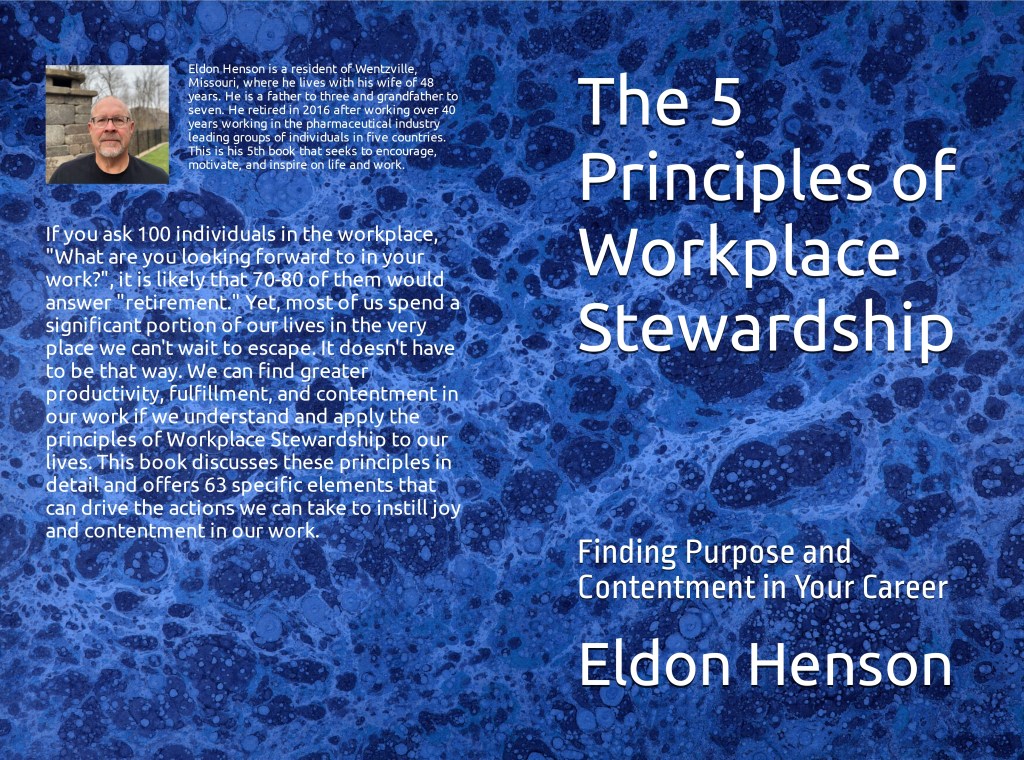
There is so much in the news these days about discontentment in the workplace. The number of able-bodied individuals that have chosen to exit the workplace is at an all-time high. Quiet quitting is rampant. Work fatigue is growing. Many or most of these issues can probably be traced to a general lack of contentment with life and, specifically, the workplace. I am sure there are many legitimate reasons for this, but life is too short, and work is too important to simply give up.
In my book, The Five Principles of Workplace Stewardship (available from Amazon), I dedicated an entire unit on Contentment. I thought it might be appropriate to provide an excerpt from the book that discusses this important topic. Finding a way to make our work purposeful and satisfying is essential fora life that is meaningful. I hope you find this excerpt helpful.
The Principle of Contentment
What is contentment?
The Wikipedia definition of contentment is:
“The state of being where one is satisfied with their current situation, and the state of affairs in one’s life as they presently are. If one is content, they are pleased with their situation and how the elements in one’s life are situated.”
So, are you content? Impossible, you might say! Many of us believe that our primary life goal is happiness. If I can get that next promotion, I’ll be happy. Once my kids are grown and I retire, I’ll be happy. I’ll finally be happy when I get that new Corvette. Paying off my mortgage will allow me to finally say that I’m happy.
We can strive our entire life to be happy, yet the rates of depression, suicide, anger, and general dissatisfaction in life have never been higher. If happiness is not the answer, could it be contentment? Maybe happiness and contentment are not the same!
Indeed! Happiness is a much different emotion than contentment. Happiness typically means “right now.” It is that feeling of accomplishment or momentary joy. It is dependent upon circumstances, rather than a satisfaction with life as it is.
Contentment, on the other hand, includes an element of “I have enough.” It is not dependent upon circumstances or something coming. Contentment can be achieved even when you aren’t happy. That sounds like a contradiction, doesn’t it. How can I be content when the circumstances of my life make me sad?
The content person is one that feels complete, not lacking any external thing. It is an internal state of being not dependent upon other individuals, other things, or the extrinsic rewards we discussed earlier. It means we have applied no contingencies… it means “enough.”
(Note: No discussion of contentment can really be complete without considering “hope.” Personally, I believe everyone wants and needs hope… that confident expectation that something promised for your future will occur. An explanation of my “hope” is provided in Appendix 1. After reading this, I believe you will better understand that absolute contentment is impossible without this hope.)
OK, so what does contentment have to do with the workplace? Why is it important to me? I believe that a lack of contentment is the reason so many individuals struggle in the workplace. They believe that their happiness depends on “that one next thing.” Their focus is on the short-term rather than long-term.
The Principle of Contentment suggests that when we understand what it means to become really content – be satisfied that we have enough now – we will be a better employee that is more productive, more collaborative, and serves the organization and its customers in a more positive manner.
So, is it even possible to achieve contentment? Aren’t we either content or not? I believe that contentment can be learned and attained much like a skill. With a new skill, we must first understand what we are trying to accomplish, nurture our abilities through defined efforts, then share that skill with others, either by benefiting others directly or teaching them the skill. Contentment is the same. To become content in our work or life, we must a) first discover or understand our purpose, b) nurture and enhance the joy that resides within us, then c) allow our contentment to extend outward in ways that make a difference to others. Ultimately, as our contentment impacts others, it becomes our purpos
Let’s begin exploring this journey to contentment by looking at our purpose.
Finding your purpose
Did you realize that your purpose is related to what drives you? T. D. Jakes perhaps said it best:
“If you can’t figure out your purpose, figure out your passion. For your passion will lead you right into your purpose.” – T. D. Jakes
So, what is passion? Passion is often defined as a strong or uncontrollable emotion. Uncontrollable? It is that feeling that makes you wake up in the morning. It that what you might define as “most important.” We all have someone or something that drives us. Passion is what makes life worth living. Some might say that they try to remain “passionless” or “evenly balanced” in the workplace. They say they are passionate off the job but check it at the door before work.
However, there are at least 10 benefits of expressing passion in what we do (also see “Finding your true passion” in Achieving your best day yet! by Eldon Henson).
Let’s look at these benefits:
- Passion gives meaning – when you have no feeling of devotion or passion in your work, you are less likely to produce a quality work product or positively impact others.
- Passion unleashes creativity – most individuals are more willing to think outside the box or express creativity for something in which they are emotionally invested.
- Passion drives success – when you really believe in something, you’ll do whatever it takes to bring success.
- Passion brings happiness – when you care about something deeply, it brings a joy or happiness that can’t be duplicated by anything else.
- Passion motivates – when you care deeply about something, you don’t have to be pushed – you strive because of love.
- Passion drives involvement – individuals that are great at anything exceed because of their passion, not necessarily their ability.
- Passion confirms your actions – when you are passionate about something, you know what is right… the feeling cannot be ignored.
- Passion represents the call of your heart – when you are passionate about something, you are more willing to take risks and are less impacted by fear… you are driven by your heart to act.
- Passion is that for which you are willing to fight – passion emboldens; it makes you do things you wouldn’t otherwise do.
- Passion makes our life (or career) journey fun – when you work at something you are passionate about, it is no longer work… it becomes fun.
When you find your passion, you find your purpose. So, a key to contentment in the workplace is doing something for which you have passion. That leads to some questions that we have all asked at one time or another:
- What if I am NOT passionate about my work?
- What if my current workplace has sucked all the passion from me?
- How can I develop passion for something I do merely to get a paycheck?
Think back to the exercise we did in Chapter 17 on determining what motivates you. When you consider those 3 most important elements of your life, do any of them drive what you do in the workplace? Typically, I believe that an individual can be content in any work situation in which they are placed… IF, there is an element of passion that motivates them. When passion is absent, it is time to consider: a) a change in work (what you do), b) a change in workplace (where you work), or c) a change in your approach to work (your attitude toward your work and coworkers). The major intent for this book is to help you accomplish c). However, when you have made every possible effort to change your approach to work without success, it may be time for a career change.
Another way you can help identify or at least better understand your purpose is to develop your own personal mission statement. In short, a personal mission statement outlines your purpose for living… what drives you… what is most important. Here are a few examples:
- “To inspire children to be caring and productive adults.”
- “To make a difference to others in the workplace and in my home.”
- “To serve Christ by loving Him and serving others.”
- “To be the best guitar player in the world… or at least my world.”
- “To laugh often, live well, and enjoy the company of others.”
- “To play hard, laugh often, and sleep fast.”
You get the idea. What is it about your life that you want to accomplish? Put that down in your own mission statement. Then, refer to it often to gauge how you are doing. Are you really accomplishing your purpose? What changes should you make to your life, work, or play? The mere process of internalizing what you hope to accomplish in your life and writing it down can help crystallize your purpose and your passion.
The bottom line is this….
“When we do what we love, we’ll love what we do.”
Finding your joy in work
Many people confuse joy with happiness. However, these are completely different emotions. Let’s compare the two:
- Happiness is temporary; joy should be permanent.
- Happiness depends upon circumstances; joy transcends circumstances.
- Happiness is usually expressed outwardly; joy is often internalized, though it evident in how one lives.
- Happiness can come and go within a day or hour; joy remains constant, though it should grow over time.
I like to think of joy as an oak tree. Perhaps in the beginning, it is small. But, as time goes by, it grows. Its limbs reach toward the heavens. Its roots become massive. It provides shade during the hot summers. It provides protection for the birds and animals, even during the most severe storms. Its colors in the fall bring excitement. Its fruit nourished the squirrels. It is solid, consistent, and dependable. Joy remains even during the storms.
Flowers, on the other hand, are like happiness. When they bloom in the spring, we smile. We use them for important occasions. Everyone sees and enjoys their beauty. But they fade quickly. They last only so long. They may be beautiful one day and gone the next. There is no assurance that their beauty will last. In fact, their beauty fades quickly as the seasons progress. Happiness depends on the circumstances of the day.
Understanding that your work may not bring you happiness and may come and go as the day unfolds is important. We cannot expect to be happy all day, every day. We should not be surprised if our work does not always bring happiness.
However, we should expect a measure of joy in what we do… even in the workplace. Creating an expectation of joy, not necessarily happiness, can help us weather the storms of life. Knowing that circumstances are temporary can help us understand that, just as the limbs and roots of the oak are strong and consistent, joy is not dependent upon the events of the day.
Making a difference for others
What is the most important reason for us to become content in the workplace? Why should a good workplace steward be content? You might think that a content worker is more productive. Yes, that a content person is more effective. But the most significant impact a content worker can have on an organization is the impact he/she might have on others. The power of contentment become multiplicative by positively impacting the organization.
I can illustrate this by contrasting two leaders that assumed similar roles in very similar organizations. One leader was not content with her life, her work, or with anyone around her. It was clear that many things, even minor things, frustrated her. As a result, her frustration transferred to those around her. The work organization became more tense, there was more stress, and, generally, work for everyone became a chore that was dreaded. Eventually, her approach became so toxic that a change was needed.
At about the same time, a new leader arrived in a similar role in another organization. This leader was much more content with life and, as a result, was more confident, more collaborative, and more considerate of others. This organization thrived under her leadership. Individuals that had been timid and reserved became more confident and willing to take risks. This leader’s contentment became a source of comfort to others that resulted in more individuals doing more than was expected. The organization became more productive, more positive, and eventually influenced functions in other areas of the company.
Yes, it is true that we need to learn the key to contentment. We need to determine what it is in life that becomes “enough.” How can we get to the point where we are satisfied with where we are and in what we are doing? Being content means we are OK when we are not in control. It means we are satisfied with the journey even when we are not in the driver’s seat.
What happens around us when we become content?
- Stress goes down for those around us.
- We complain less.
- We give up the notion that we are victims of our circumstances.
- We want others to have what we have (in terms of contentment and satisfaction).
- We are more likely to serve others.
- We become more interested in the success of others.
- We spend less time feeling sorry for ourselves and more time achieving needed results.
- We become more favored employees (which, in turn, could lead to greater opportunities within the company).
- Our joy grows.
- Our attitude becomes one that others want to emulate.
- We come home with a better outlook.
- We dread Sunday evenings less.
- We become better parents, spouses, friends, and coworkers.
- We become servants to others.
In short, becoming content drives much positive in our lives. And, because of our new approach, better things are likely in our careers.
I realize that contentment is not as simple as waking up one day and declaring that you are now content. However, it does start by realizing that living a defeated, stifled, and victim existence will not help you achieve your dreams and desires. Taking that first step to “wanting” to become content will lead you to making the kinds of adjustments that will get you there. Then, making that decision every day – deciding that your life will be marked by joy, by serving others, and by knowing that your life is enough – will allow you to grow toward that lofty and worthy goal.
Summary: Key elements of Contentment
- Contentment is that state in life when you become satisfied with your state of affairs and you accept that you have enough. A content person does not have to continually strive for acceptance, agreement, or achievement that leads to strife, defeat, stress, and dread.
- Contentment is not dependent on circumstances. It is an internal state of being not dependent upon other individuals, other things, or extrinsic rewards.
- To be truly content in our work, we must discover our purpose, nurture and enhance the joy that resides within us, and allow our contentment to extend outward in ways that make a difference to others.
- When you find your passion, you find your purpose.
- Finding and acting upon your passion is essential to achieving contentment.
- Passion is a strong and often uncontrollable emotion that makes life worth living and makes work worth our time and energy.
- Passion has many benefits that drive our work ethic, our work results, and our work satisfaction.
- Happiness is not the same as joy. Whereas happiness is temporary, joy is permanent; whereas happiness is dependent upon circumstances, joy transcends circumstances. Joy is what remains when happiness has been extinguished.
- Understanding and seeking joy can help us weather the storms that come and can help us remain constant, consistent, and calm when others are afflicted by circumstances.
- Contentment has the power to change a person, a group, a family, or an entire organization.
- The contentment of one person can significantly impact others.
- Contentment is marked by service to others.
- Contentment comes when we decide each day that our life will be marked by joy, by serving others, and by knowing that your life is enough.








